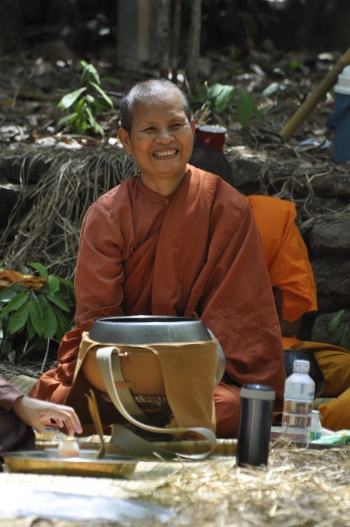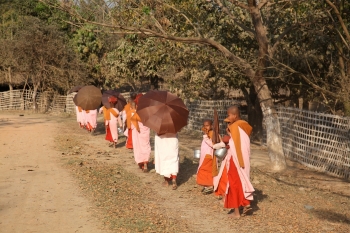It is beautiful to see a flower unfold and open from the sun’s light and earth’s moisture. It is a sight at once special but normal, natural, and necessary. For thousands of women who yearn to unfold and flower as a true Theravada bhikkhuni, the space and nourishment they need will help them enjoy a greater sense of flow, connection, and belonging. As the Dhamma is beyond gender distinctions, we believe enfranchising girls and women in Sakyamuni’s spiritual project must be a critical priority.
Human life is a precious opportunity to grow spiritually. Both women and men have accumulated great merit in their previous lives to be reborn as human beings. Even rarer than human rebirth is the desire to ordain, and it is our responsibility as Buddhists to provide the fertile ground of full enlightenment for as many as possible. The most powerful strength of the sangha is that it was designed by the Buddha to facilitate such an ambitious ideal.
It is possible to debate what the Buddha personally thought about his stepmother’s desire to join his early Order. But we can at least be certain he spoke clearly about a Fourfold Community that required monks and nuns. Therefore, in our opinion, the full ordination of women is not something that destabilizes tradition, but an honest affirmation of the Buddha’s most ancient institution. With this “yes” by and for the female half of humanity, Buddhism’s strength is doubled.
We believe Buddhism can only flourish and prosper when its spiritual riches are freely and shared with women. Involving women (and men) in a process honest to the Buddha's intentions, from the highest spiritual authority down to the everyday life of faith, is something all will have to address irrespective of gender equality concerns. Religious communities with declining or absent female involvement are demographic time bombs, and all Buddhist traditions have far more pressing issues concerning their survival and propagation than debating the merits of female monastics, when it is evident that the Buddha explicitly acknowledged them.
Most Buddhists might agree that we should urgently and wholeheartedly support a greater ratio of female leadership. But this objective will always be hampered by any denial of full ordination to women, which is almost always based on certain interpretations of the Vinaya. Exegetical justifications of sexism are at best anachronisms. Women should not be penalized for having the courage and fortitude to try walking the path of a female monastic. Women are worth learning from, women can become accomplished masters, and they certainly need the immediate and wider support that no leader can do without.
Over the last few years, some monastics and scholars have had the dedication, clarity and endurance to undertake the necessary investigation into the traditions in which Theravada men and women live. By examining the ways in which they have been transmitted, and the assumptions that underlie them, they have been able to expose and question some of these assumptions, enabling people to see tradition in a new light. They have helped both women and men to separate the original intentions of the Buddha from cultural accretions. These teachers have been able to create new currents within the vast river of Buddhist tradition, and allow the causes and conditions that support female monastic ordination to flow. And at present there are over one thousand Theravada bhikkhunis in Sri Lanka, over fifty in Thailand, and more in Nepal and the West.
Women’s full ordination may still seem bizarre and an aberrant inversion of the natural way of monasticism. However, this has not been and never will be a truly Buddhist way to speak about the world. Truly conservative and traditional Buddhism acknowledges only one source of truth, Dharma. All other phenomena and forms are self-less and subject to change. Just as a person’s self-lessness means that his moral weaknesses can be overcome, it is not impossible to reinterpret the Vinaya’s more dubious-seeming rules for the better.
For those who recognize the importance of women in keeping the tradition alive, full ordination is a natural prospect. But we must take good care to keep the causes and conditions strong by defining the debate and framing the parameters of the narrative, lest the momentum becomes distant and unattainable.
















